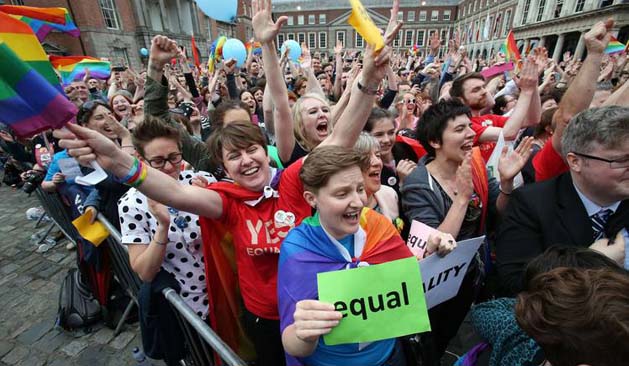After years of stalling, same-sex marriage now looks possible before the end of the year. The 62 per cent vote for same-sex marriage in Ireland, a country long dominated by the conservatism of the Catholic Church, has further added to the momentum for change.
Tony Abbott has signaled his willingness to allow a conscience vote so long as the legislation is moved as a cross-party bill supported by individual MPs on both sides of politics. Abbott is being driven by hard headed political calculation. His shift is designed to avoid Labor leader Bill Shorten gaining the credit for introducing same-sex marriage.
This means the main task now is reinforcing and deepening the already overwhelming support for marriage equality, not demanding a conscience vote. The numbers in parliament for same-sex marriage are still tight. Current estimates are that in the lower house same-sex marriage is still two votes short.
There should be further demonstrations demanding all MPs vote to support marriage equality, and backing the push for Labor to compel its MPs to vote in favour.
If Labor officially instructed its MPs to support same-sex marriage, this would make success much more likely.
Some argue that this would frighten the Liberals out of allowing a conscience vote. But it is Abbott’s desire to avoid Labor being seen as the only supporters of same-sex marriage that has pushed him into accepting a conscience vote.
The acceptance that marriage equality should come through a conscience vote also sets a bad political precedent.
Marriage equality is an issue of discrimination. LGBT people should have the same right to get married as couples of the opposite sex.
Supporting discrimination against LGBT people should not be considered acceptable, or a personal issue of “conscience”. Racist and sexist discrimination are not considered “conscience” issues. Why should homophobic discrimination be any different? When the Labor Party under Kevin Rudd removed homophobic discrimination against same-sex couples in tax, pension and superannuation laws in 2009 there was no thought of giving MPs a conscience vote.
The homophobic attitudes that stand behind opposition to marriage equality need to be challenged, not accepted as “personal beliefs”. The introduction of same-sex marriage will not be the end of the fight for LGBT liberation. Homophobia remains entrenched in Australia. Two surveys earlier this year showed 27 per cent of gay men and 17 per cent of lesbians had received threats of harm on the sporting field, while around 40 per cent of teenage boys say they would feel “uncomfortable” having a gay person in their friendship group.
The source of this is promotion of the nuclear family under capitalism, in order to force the cost of reproduction of the next generation of workers onto ordinary people. Abbott has tried to reinforce the family with his new budget by funding childcare at the same time as cutting universities, health and education spending. The fight for equal marriage needs strengthen the fight against the wider homophobia that has denied LGBT people marriage rights for so long.






